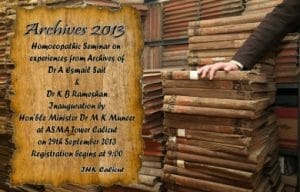After the last year Lancet article there was a lot of questioning on the efficacy of Homoeopathy. In that entire episode Homoepathy was discussed much more than it has ever been discussed.
But, lot of myths which are popular about homoeopathy were risen again in the minds of patients and students.
Innumerable cases have been cured with homoeopathy but its efficacy is still doubted by some prejudiced people. The fact is that people have many false notions about homoeopathy.
Here is an attempt to discuss all myths about of homoeopathy and the fact of it so as to help the students understand their science in a better way and apply it.
MYTHS prevailing ad the FACT of it
1. It is slow to act
This myth is popular, because most of the people approaching a Homoeopath after they have tried all treatments and by that time their acute complaints have become chronic. Homoeopathy is, in fact, FAST AND RAPID IN ACTION in conditions like acute infections, fever, diarrhea, etc. while in cases of chronic diseases as the disease has been there since a long time it does take time to cure but recognizable improvement starts within two to three weeks time.
2. Homoeopathy is more placebo effect and faith healing
Scientific double blind studies have indicated that homoeopathy is far above the placebo effect. The effect of homoeopathic medicine has been observed during clinical trials carried out for various diseases. Recognized homoeopathic institutions are carrying out these clinical trials. There is a regulating body, the Central Council of Research in Homoeopathy, which monitors these research works and keeps record of these trials with scientific evidence.
3. All medicines are same, small and white
Homoeopathic medicines are prepared in an alcohol base. The white sugar globules or pills are only a medium or vehicle for the transport of the medicine into the body. The liquid medicine is dispensed in the sugar globules that are made from lactose.
4. Homeopathy is only good for chronic cases
The notion that homoeopathy works well in chronic cases is true but it works equally well in acute cases too with the additional advantage that the recurrence of acute problems like that of tonsillitis, recurrent cold and coughs, frequent skin allergies is markedly reduced by the use of constitutional homoeopathic medications. Homoeopathy has excellent medicines to treat colic, diarrhoea, headache, cough, toothache, viral fevers etc.
5. Homoeopathy first aggravates the disease and then improves
It is a myth. It does not happen to all cases. But if medicine is repeated more than the need, or the potency chosen is higher than required by the patient then there is a medicinal aggravation or increase in the complaints, but these symptoms would subside on its own as soon as that medicine is withdrawn and the right potency medicine is to be administrated for getting the curative action.
6. Homoeopathy can only help functional problems such as pain, weakness.
Homoeopathy has proved its efficacy for the treatment of structural pathology. Numerous documented cases where the reversal of the structural pathology has taken place indicating the depth of homoeopathy action. Clinical studies on diseases like hepatitis, renal calculi, cancer, tumours, fibroids, polyps have shown improvement with homoeopathic medicines.
7. Dietic restrictions
It is a myth regarding restriction in diet like onion, garlic, perfume, paan and tobacco. These medicines have been used on patients who are habituated to coffee and betel. IT ALWAYS ACTS. But yes, certain homoeopathic medicines when given, can be inactivated by certain substances so only in those medicines these restrictions are required and not in all the medicines.
8. Homoeopathy is practiced by some quacks who have no formal medical training
A registered homoeopathic practitioner undergoes training of five and half year as any other medical professional and studies all basic subjects like anatomy, physiology, pathology surgery as in curriculum of modern medicine with difference being addition of three subjects on Homoeopathy.
9. Homoeopathy does not give importance to diagnosis
As a matter of fact diagnosis is of utmost importance for a Homoeopath as his sound knowledge of disease will help him differentiate between common symptoms of disease and the individualistic symptoms of person thus help him select the homoeopathic medicine on individualistic symptoms which is basis of homoeopathic prescription
10. Homoeopathy is a miracle medicine and it cures every disease under the sun.
Homoeopathy is no panacea. It has its own scope and set of limitations. Few examples of areas where homoeopathy can offer cure are Allergic disorders, Asthma, ENT, Female disorders like Menstrual troubles and Hormonal disorders, Infertility, Skin disorders like Eczema, Psoriasis, Urticaria, Mental disorders, Pshyo-somatic disorders: like IBS, Hyperacidity syndrome, Headaches, Respiratory infections and Stress.
Disease where irreversible structural changes have taken place like malignancies and AIDS Homoeopathy is given to improve the quality of life.
Limitations of Homoeopathy include emergencies like myocardial infarction, paralytic strokes, diabetic comas, accidents, cases where surgery is inevitable like third degree piles, hernias, coronary artery blockages, etc.
Homoeopathy aims to help the patients achieve freedom from limitations in their lives and to reach a level of health where they can live a better and healthier life.
Dr Geeta Rani Arora . BHMS, CERTIFICATE-CAM, NIH, USA
R&D Officer,SBL(P)LTD.
E-mail : drgeetarani@rediffmail.com


Ma’am, I just have a small question…
Is there any kind of diet pattern that enhances the action of homeopathic medicines?? And on average, how much time is required by homeopathy to cure a disease?
Some restrictions depending upon medicine an disease